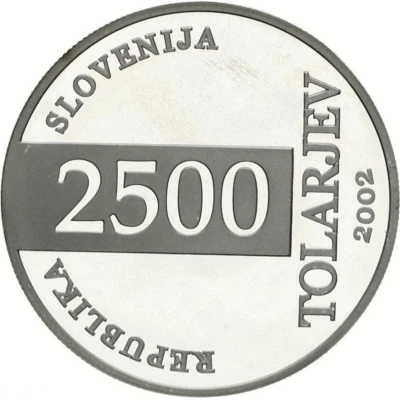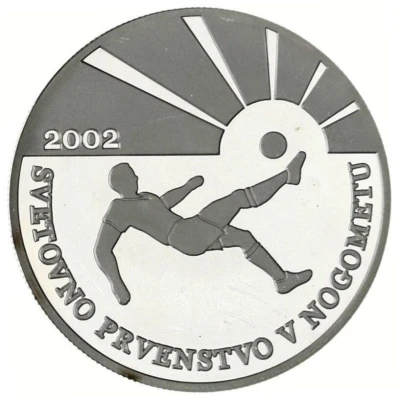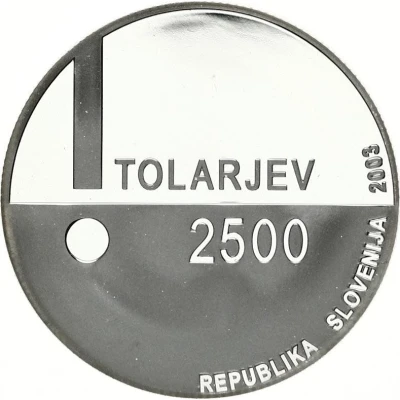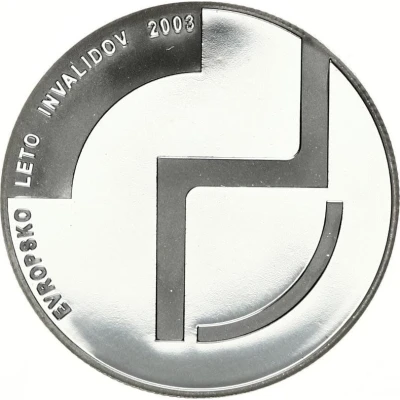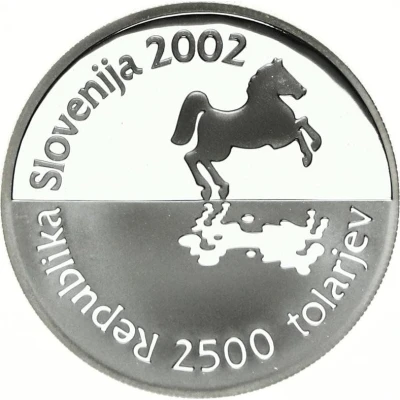
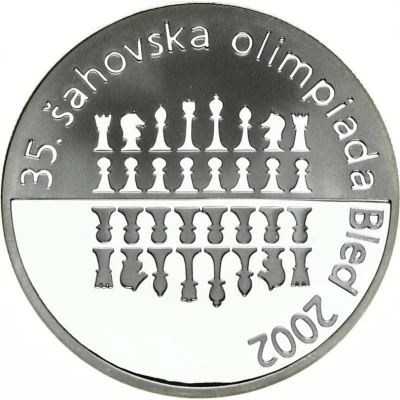

© The Coinhouse Auctions
2500 Tolarjev 35th Chess Olympiad
2002 year| Silver (.925) | 15 g | 32 mm |
| Issuer | Slovenia |
|---|---|
| Period | Republic (1991-date) |
| Type | Non-circulating coin |
| Year | 2002 |
| Value | 2500 Tolarjev (2500 SIT) |
| Currency | Tolar (1991-2006) |
| Composition | Silver (.925) |
| Weight | 15 g |
| Diameter | 32 mm |
| Shape | Round |
| Technique | Milled |
| Orientation | Medal alignment ↑↑ |
| Demonetized | 15 January 2007 |
| Updated | 2024-10-07 |
| Numista | N#24836 |
|---|---|
| Rarity index | 90% |
Reverse
Chess pieces in starting positions and reflection
Script: Latin
Lettering: 35. šahovska olimpiada Bled 2002
Designer: Miljenko Licul
Edge
First mintage with 200 reeds and second mintage with 160 reeds.
Comment
Chess is a game for two players each of whom moves his 16 pieces according to fixed rules across a checkerboard and tries to checkmate his opponent´s king. Given the common expressions used for individual moves and combinations in any language, chess can be considered constructor of bridges between races, nations and people of different beliefs.There are no reliable sources on the origins of the so-called "royal game", however, its cradle is presumably somewhere in Asia, most probably in what is today Iran or India. The oldest written records on chess date from the late 6th century Persia. Merchants brought the game to Europe at the turn of the first millennium. In the Middle Ages and especially at the beginning of the Modern Age chess became a popular game. Problem chess established itself in Europe long before chess tournaments did. This was also the case in Slovenia: ever since 1856 Slovenians were also awarded the highest prizes. At the turn of the 19th century Milan Vidmar was one of the world´s top chess players. The 20th century registered several Slovenian grand masters, like Vasja Pirc, Bruno Parma, Albin Planinec, Stojan Puc and others. Chess has been popular among the youth and there are many potential future masters among the participants in the youth chess tournaments.
The Slovenian chess gained its highest recognition on the occasion of the congress of FIDE, the international chess organisation, in 1998 when Slovenia was entrusted with the organisation of the 35th Chess Olympiad Bled, Slovenia 2002, with the greatest chess masters from all over the world participating.
To mark this event, which countries get to host perhaps only once in a lifetime of their average citizen, the Republic of Slovenia is issuing two commemorative coins. The front of the coins features the 32 chess pieces in starting position of the game and on the back there is the official logotype of the Olympiad – an image of a reared up horse with its reflection in the water (the lake of Bled).
Accessed at: https://www.bsi.si/en/banknotes-and-coins/slovenian-tolar/commemorative-editions-republic-of-slovenia/on-occasion-of-the-35th-chess-olympiad-bled-slovenia-2002
Interesting fact
One interesting fact about the 2500 Tolarjev (35th Chess Olympiad) 2002 coin from Slovenia is that it features a unique design that combines the theme of chess and the country's national symbols. The obverse side of the coin depicts a stylized chessboard with a Slovenian flag in the center, while the reverse side features a stylized image of a chess piece, the "Slovenian Lion," which is a symbol of the country's national identity. This coin was minted to commemorate Slovenia's participation in the 35th Chess Olympiad, which took place in 2002.
Price
| Date | Mintage | VG | F | VF | XF | AU | UNC |
|---|---|---|---|---|---|---|---|
| 2002 | 1000 | - | - | - | - | - | - |
Values in the table are based on evaluations by sales realized on Internet platforms. They serve as an indication only for 2500 Tolarjev (35th Chess Olympiad) 2002 coin.
